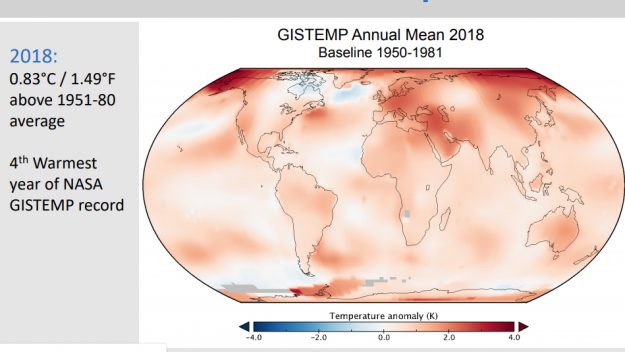2018 was the fourth hottest year across the globe after 2016, 2015 and 2017. What does it mean for Cardiff and the UK?

Last year, Cardiff witnessed a number of extreme weather events. For Emma Scanlan, who works at a private accommodation facility in the Grangetown area of Cardiff, the months of June, July and August during the summer of 2018 were the hottest.
“This affected my work rate and also of other colleagues, as we had to take more regular breaks to prevent staff from overheating, especially our housekeeping and maintenance staff,” says Scanlan.
“Generally snowfall occurs in January and February but last year it happened in late March. This unprecedented snowfall was very heavy, which affected our staffing levels, as the public transport got cancelled,” she said.
Emma’s ordeal of an unusual 2018 is true, as the latest report by National Oceanic and Atmospheric Administration (NOAA) and National Aeronautics and Space Administration (NASA) has confirmed that the planet was 1.5°F (0.83°C) warmer than the average of 1951-80. This makes 2018 the fourth warmest year since record-keeping began in 1880.

Climate action in Cardiff
“We are most vulnerable to the impacts associated with sea level rise. The latest UKCP18 estimates suggest sea level rise for Cardiff could be as much as 1.13m by 2100 (relative to 1981-2000 average), depending on our future emissions,” said Professor Ian Hall, Head of the School of Earth and Ocean Sciences at Cardiff University. “This means that we can expect an increase in the frequency and magnitude of extreme water levels and therefore greater risk of coastal flooding.”

“Cardiff is obviously vulnerable to flooding and other extreme weather events, and increasing summer temperatures,” said Bleddyn Lake, spokesperson for Friends of the Earth Cymru.
Bleddyn urges the Cardiff Council to take its pension fund money out of fossil fuel companies and develop a comprehensive climate change plan for the city.
“Companies and businesses in Cardiff need to join in and have business strategies that make sure they also are doing their bit to limit global warming,” said Bleddyn.
“350,000 people who live in Cardiff are also part of the solution. Walking and cycling more, switching to recycled paper products, using less single use plastics, eating less meat and dairy products, switching your electricity supplier to a 100% renewable energy tariff, holidaying in the UK, planting trees and above all, working together to tell our politicians and business leaders that action is required and is required now,” said Bleddyn.
Climate change in the UK
Climate change has increased the average temperature of UK by 1°C, as compared to the last 100 years, according to the Economic and Social Research Council (ESRC). This rise in temperature led to the 2003 heatwave in the UK, which killed over 2,000 people. Inaction on climate change can be disastrous for the UK, as it can increase summer temperatures up to 5.4°C (9.7°F) and winter temperatures up to 4.2°C (7.6°F) by 2070.
The impacts of climate change on the UK are evident, as the UK government’s Climate Change Risk Assessment 2017 has acknowledged that the coast is experiencing rise in sea level at 3mm every year.
The report cautioned that surging temperatures, along with other factors could lead to overheating, which may double the heat-related deaths by 2050. In Wales, the report warned that there are chances of flooding and droughts, which may worsen due to unsustainable land management practices.
.embed-container { position: relative; padding-bottom: 56.25%; height: 0; overflow: hidden; max-width: 100%; } .embed-container iframe, .embed-container object, .embed-container embed { position: absolute; top: 0; left: 0; width: 100%; height: 100%; }
Nasa’s video shows change in global temperatures from 1880-2017
The UK has ambitious plans to phase out coal-fired power plants by 2025. Wales has developed plans to tackle climate change by reducing up to 80% of its carbon emissions by 2050.
